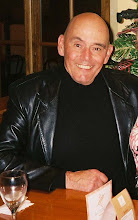If the roll is ever called up yonder to bring members of the Bush administration to account for their eight year reign of terror and lawlessness, David Addington ought to be in line right behind his boss Dick Cheney and ahead of even Donald Rumsfeld, Douglas Feith and John Yoo.
Yesterday, Addington told a Senate committee he would not answer questions because "terrorists might be watching C-SPAN." So, in addition to being a dangerous man, he appears to be a paranoid schizophrenic. Well, most paranoid schizophrenis are dangerous.
Addington is Cheney’s hit man, his “go to” guy when the Vice President wants to punch another hole in the Constitution or ignore inconvenient laws. Promoted to chief of staff from his position as Cheney’s Alfredo – in other words, his Alberto Gonzales – after Scooter Libby was indicted and resigned, Addington is both more extreme and more politically tone-deaf than Libby. He and Cheney are the harbingers of bad times for Bush: When their names are in the news, political peril seems to follow.
Whenever the hyper-secretive Addington name has surfaced, it’s usually been with embarrassing results. In 2002, for example, Chickenhead Productions unveiled Whitehouse.org, a parody website replete with photos and a fake bio of Lynne Cheney. Soon after the bio appeared, claiming that the second lady "likes movies, Infusium 23 Shampoo and postmodernist interpretative dance," Addington fired off a letter to the company demanding that it "delete the photographs of [Lynne Cheney] and the fictitious biographical statement about her from the website."
Rather than getting the site to remove the supposedly offending material, Addington's letter pushed droves of curious web surfers to Whitehouse.org to see Mrs. Cheney lampooned. It also led reporters to query Cheney's office about the VP's role in the affair, which denied he had any knowledge about the letter.
Some three years later, on October 31, 2005, when the real White House announced that Addington was going to replace Libby as Cheney's chief of staff, Whitehouse.org was quick to react, posting on his company's website a message to ASddington: Addington: "Chickenhead would like to formally congratulate its best-ever pal, David Addington, on his recent promotion."
According to the New Republic, the Chickenhead incident is emblematic of the larger role Cheney's staff – specifically Addington – plays in the Bush White House. On issue after issue, the Office of the Vice President overreacts and overreaches, pushing policies that end up embarrassing the administration and from which, more often than not, President Bush must retreat. But Cheney never seems to learn any lessons from these capers. If he had, he never would have promoted David Addington.
Addington was one of several Cheney aides cited in connection with the ongoing investigation by Special Prosecutor Patrick Fitzgerald into PlameGate. Although not charged, Addington was mentioned in the indictment as part of a group of officials in Cheney's office who tried in early 2003 to identify Valerie Plame, gather information about her husband Joseph Wilson's trip to Niger and then spread this information.
The special prosecutor's investigation is only one of a series of controversies that have plagued Addington during his time in the VP's office. He has been accused of playing a central role in the decision to block the release of key documents to the Senate Intelligence Committee regarding its investigation into pre-war intelligence. In 2002, he helped draft the White House "torture memos," which claimed that the president could sidestep the Geneva Conventions in the "war on terror". In 2001, when the General Accounting Office was trying to investigate the role of executives and lobbyists in helping Cheney put together his energy plan, Addington consistently attacked in letters to the GAO the agency's authority to investigate the matter. And Addington led efforts to block Congress's attempt to draft stringent rules governing the treatment of detainees in places like Abu Ghraib.
More recently, Addington was blamed for pushing Cheney to resist efforts by Bush administration lawyers to reverse the White House position on whether to allow court oversight of the National Security Agency's warrantless surveillance programmeme. When the administration announced in early January 2007 that it would allow oversight of the programmeme, Addington was viewed as having "clearly lost this round," as one unnamed official told the Washington Post.
The surveillance programme sidestepped a law passed by Congress in 1978 in response to Watergate. The law requires that efforts by the government to eavesdrop on U.S. citizens be vetted by the Foreign Intelligence Surveillance Court. It is meant to protect civil liberties and prevent abuses of executive power. When former Secretary of State Colin Powell first heard about the administration's surveillance programme, revealed by the New York Times in late 2005, he said: "It's Addington. He doesn't care about the Constitution."
The net effect of Addington's and other administration lawyers influence on the president's own views, says Bruce Fein, a generally pro-Bush Republican activist, is "quite alarming." Fein says “Addington and his cohorts have "staked out powers that are a universe beyond any other administration. This president has made claims that are really quite alarming. He's said that there are no restraints on his ability, as he sees it, to collect intelligence, to open mail, to commit torture, and to use electronic surveillance. If you used the president's reasoning, you could shut down Congress for leaking too much. His war powers allow him to declare anyone an illegal combatant.”
In other words, in Addington’s mind the entire world is a battlefield. According to this perverse view of the Constitution and American law, Bush could kill someone in Lafayette Park if he wants. It's got the stench of Louis XIV: “I am the State.”
Tom Degan
1958-2023
To all Tom’s faithful readers of the Rant, we are sad to announce that he
passed away on December 7th, 2023. Thank you so much for th...

